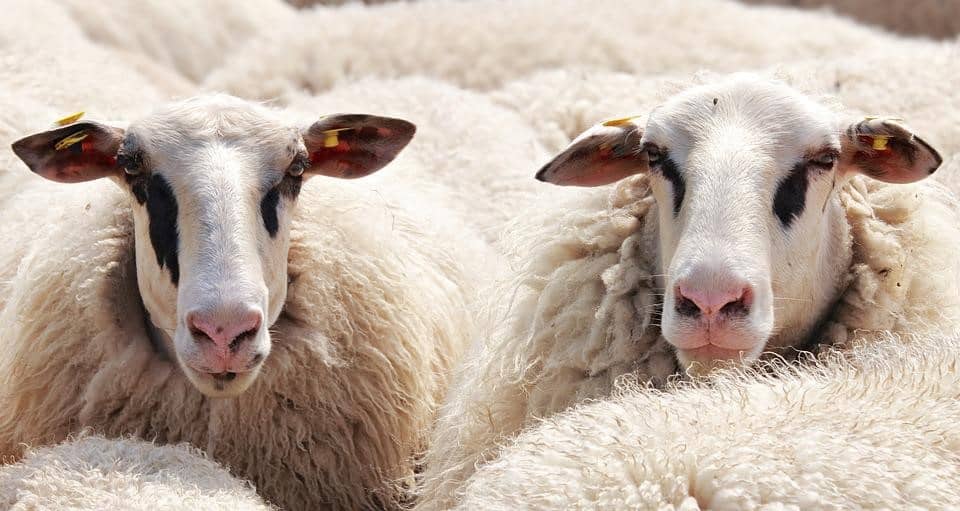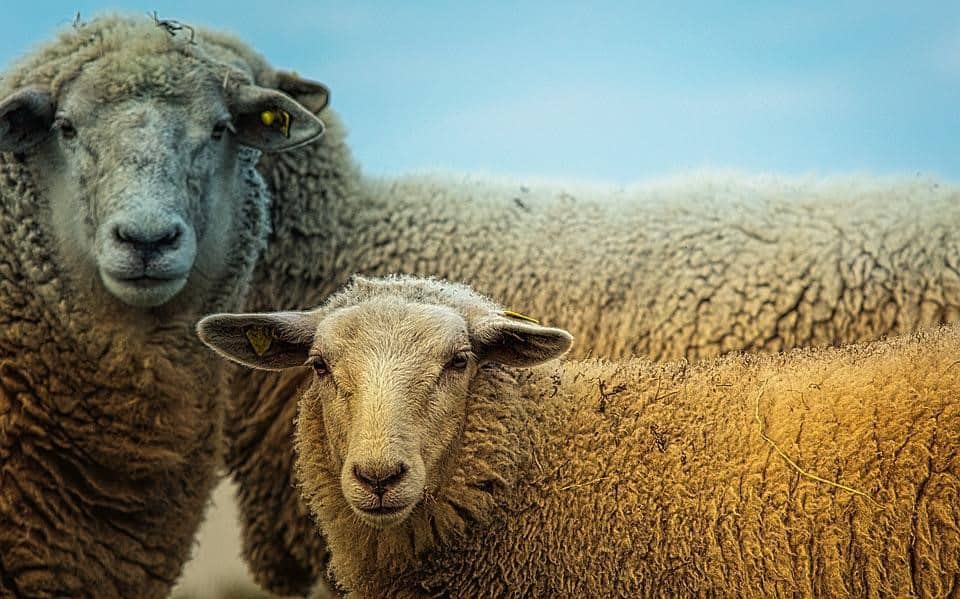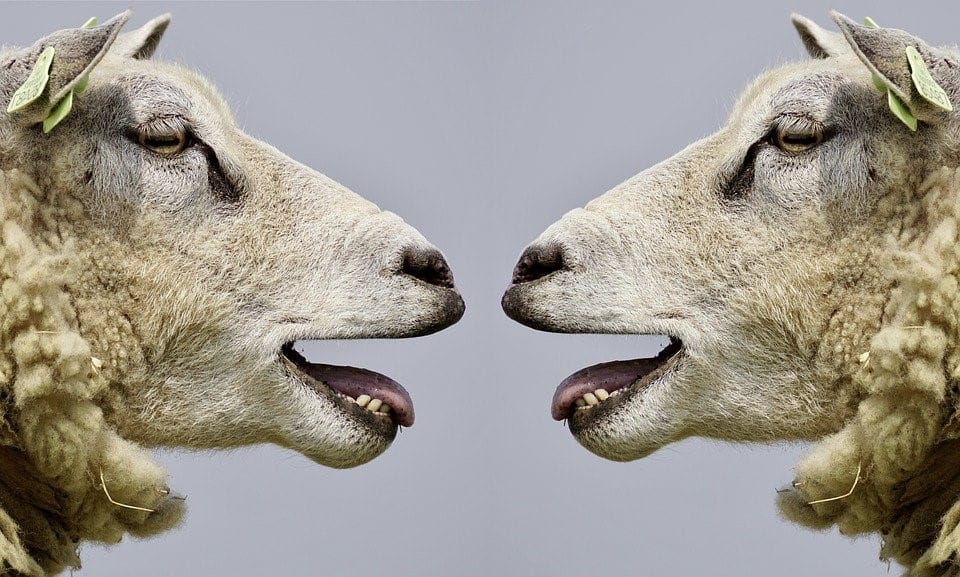Here I explain how much does a sheep cost. Many factors go into determining the price of livestock. Some of them include:
- Breed, age, gender
- Size, weight
- Genetic traits, pedigree, lineage
- Wool quality
- Time of year (season)
- For breeding sheep: fertility status
- Geographic location
- Health and vaccination status
- For show sheep: awards
- Supply and demand
Factors such as sheep breed and age play a big role in determining the price of sheep. However, you can still get a rough estimate on the prevailing prices of rams, ewes, and yearling ewes.
Keep reading to learn how much sheep cost and the factors that determine the price differences.
How Much Does a Sheep Cost
According to the American Sheep Industry Association, the price of a 60 to 90-pound sheep ranges from $200 to just over $300 depending on where you buy and the breed of sheep you buy. Rams, which typically have more meat and, as such, weigh more than ewes, cost over $300.
Hobby farmers and homesteaders may want to raise feeder sheep to fatten for meat or to sell later at a higher weight. Because they are young, they will be less expensive ($50 – $200) than purchasing an adult sheep for closer to $250+.
How Much Does a Lamb Cost
Since they are smaller and not at market weight, lambs trade for a much lower price. In general, lambs cost around $40 to $50 but a lot will depend on the bloodline, the breed, and if you buy from a reputable breeder.
Factors That Affect Sheep Costs
While the above prices are approximate and a good estimate for what you would expect to pay, know there really isn’t a fixed price for sheep. Many factors go into determining how much you will pay for the specific sheep or ewe flock you want to buy.
Here are some factors that determine the final purchase price of sheep in almost any market.

Breeds of Sheep
Certain sheep breeds have quite frankly cornered the market in terms of pricing. Breeds such as Merino sheep typically cost much more than other breeds. This is mostly because Merino sheep offer great value to a sheep farmer.
Since Merino sheep are primarily wool sheep, not only can you sell their meat and milk, but you get to enjoy the proceeds of their wool long before you get to consider their meat production capabilities.
There are purebred sheep such as the Valais Blacknose, mostly found in Switzerland, that command much higher prices, ranging in the thousands of dollars. This kind of pricing comes from the fact that these are high-quality dual-purpose sheep that are raised for both their meat as well as their wool.
High-producing sheep milking breeds will also cost more than typical producers.
The Sheep Flock You Want
Whether you own a small farm or are raising sheep commercially, you need a starter flock. These are the very first sheep that you will have on your farm, and depending on how well you select them, they can be the original breeding stock from which you grow your sheep numbers.
This can be especially important if you are raising meat sheep breeds for a sustainable meat source and culling ewes after spring lambing.
The animals you choose for this starter flock depend on your specific goals. It’s important to buy your starter flock from a reputable breeder who will give you exactly what you need.
Reputable breeders, as you would imagine, aren’t cheap and have varying prices for different types of sheep on their farms.
Young sheep generally trade for a much lower price than adult sheep. For the most part, lamb prices are typically lower than most other prices, and you can expect to spend around $50 for ram lambs and slightly more for ewe lambs as they can be expected to multiply in the future.
Older ewes tend to cost much less (under $200). This is mostly because their milk, lambing capabilities, and meat productivity have reduced over time.
On the other hand, prime ewes fetch a premium price and could range from $200 to more than $400, but typically retail at around the $300 mark. This is because they have extremely high chances of lamb production. Ewes that are pregnant tend to trade for well over $400.
Slaughter lamb prices also vary depending on where you buy them. In many cases, market lambs are sold to restauranteurs and other professionals who need them to meet the demand for lamb on their menus.
These prices, therefore, vary depending on the demand and pedigree of restaurants competing for them in your local area.
Wool Production
This is especially important for those interested in sheep farming to produce wool. While almost every breed of sheep produces wool, only a few specific breeds can produce wool at a commercial level.
On average, sheep can produce around 3 pounds of wool, while some special breeds can get up to 20 pounds.
The breeds that produce more wool in terms of weight and quality command higher prices regardless of age. Rambouillet sheep and Merino sheep are two breeds which produce valuable, sought-after wool.
Weight and Body Condition
Rams tend to weigh around 350 pounds on average, and ewes tend to weigh around 220 lbs. As you would expect, sheep that haven’t reached the expected market weight will sell for far less than those that have.

Where Can You Buy Sheep?
Every county has an established livestock marketing information center where you can find information on where to buy almost every kind of livestock you want, from cows to sheep, goats, and so on. While these resource centers are extremely useful, there’s one other place that is almost always a better option: a local farm.
One of the best places to buy sheep, or pretty much any other kind of livestock, is from a local farmer raising them. There are several good reasons for this:
- Fairer prices: The prices will probably be more favorable than in an established marketplace where vendors tend to place their own margins on the actual selling prices of the farmers.
- Excellent stock: You can almost always be sure that the sheep farm animals are healthy. Local sheep producers take the animal’s health very seriously, as any disease could bring down the entire flock. So you can be sure that the flock is fully vaccinated and well-cared for as opposed to random marketplace sheep that could be on the market because they are sick or sickly.
- Feed: Buying sheep from a local small farm also gives you the advantage of knowing that the feed, pasture, and grass the sheep need are available locally. At the very least, you could always ask the farmer how they keep their flock so well-fed and healthy.
There’s also the added advantage that comes with familiarity and acclimatization. Buying sheep from a local sheep producer will give you peace of mind knowing that the sheep you buy are already used to living in your region and, as such, are unlikely to fall sick or underperform due to acclimatization issues.
Other Cost Factors That Come With Raising Sheep
Apart from the initial purchase price, other cost factors come with raising sheep. These are all factors you need to consider before deciding on the number of sheep to buy. These factors include:
- Living expenses
- Medical expenses
- Feeding expenses
- Barn construction and insulation costs
- Cost for shearing sheep – You can learn how to shear a sheep yourself, however, in the beginning, you may want to hire a professional sheep shearer to see how it is done. They typically charge per head of sheep.
There’s no doubt that sheep farming can be an absolute joy for those who enjoy raising livestock. Apart from how much it costs to buy them, these other expenses also come into play. And much like the actual purchase price of the sheep, the actual cost of these expenses will vary from region to region.
That being said, with proper management and research, raising sheep isn’t that expensive. They generally provide a good return on investment. The prices highlighted here give you an idea of how much you will need to pay to acquire sheep. If you buy good breeding stock, you could very well manage them into a fully-fledged flock of your own.
If you are interested in learning more about sheep or about raising sheep on your farm or homestead, learn how long are sheep pregnant and how many sheep you can keep per acre. How you care for sheep goes a long way to affect how long sheep live.
If you got a bit more specific with the question and asked something along the line of “how much do adult Suffolk sheep or Merino sheep cost in a specific state?” you will start getting something close to definitive answers.
Learn more:

